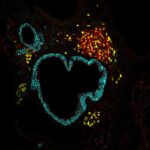
Publication: Genetic and antibody-mediated reprogramming of natural killer cell missing-self recognition in vivo.
Published in: Proceedings of the National Academy of Sciences of the United States of America, 2009, 106 (31), pp.12879-84. ⟨10.1073/pnas.0901653106⟩
Authors: Caroline Sola, Pascale André, Céline Lemmers, Nicolas Fuseri, Cécile Bonnafous, Mathieu Bléry, Nicolai R Wagtmann, François Romagné, Eric Vivier, Sophie Ugolini
Summary
Natural killer (NK) cells are lymphocytes of the innate immune system able to recognize and kill tumors lacking self-MHC class I molecules. This “missing-self” recognition is mediated by the lack of engagement of MHC class I-specific inhibitory NK cell receptors that include the killer cell Ig-like receptors (KIR) in humans and Ly49 molecules in mice. A promising immunotherapeutic strategy against MHC class I(+) cancer cells is to block NK cell inhibitory receptors using monoclonal antibodies (mAb). However, interactions between MHC class I molecules and their inhibitory receptors are also required for the acquisition of NK cell functional competence, a process referred as to “education.” In addition, inhibitory receptors are involved in self-tolerance on educated NK cells. Here, we developed a preclinical mouse model in which all NK cells are educated by a single transgenic inhibitory receptor, human KIR2DL3, through the engagement with its HLA-Cw3 ligand. This approach revealed that NK cells could be reprogrammed to control the development of mouse syngenic tumors in vivo. Moreover, in vivo anti-KIR mAb treatment induced the killing of HLA(+) target cells without breaking self-tolerance. Finally, the long-term infusion of anti-KIR mAb neither abolished NK cell education nor tumor cell recognition. Therefore, these results strongly support the use of inhibitory receptor blockade in cancer patients.
Link to Pubmed [PMID] – 19561305
Link to HAL – hal-00431867
Link to DOI – 10.1073/pnas.0901653106


